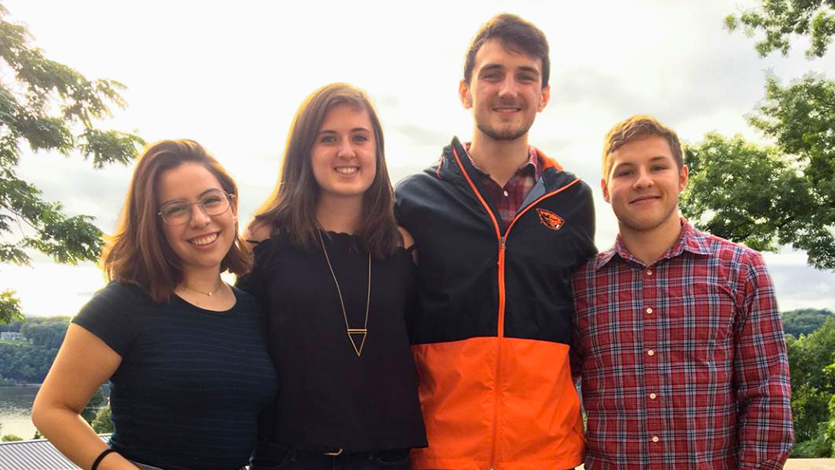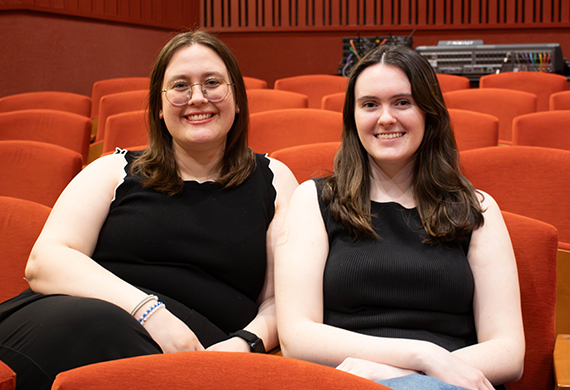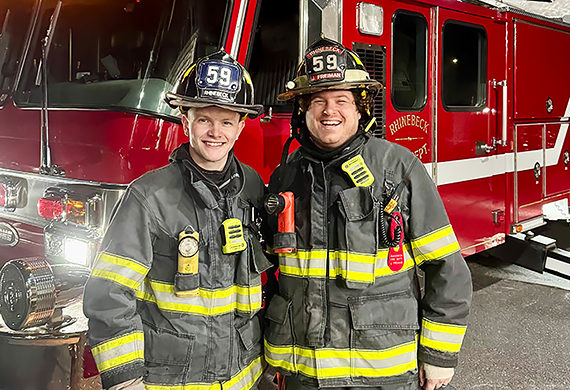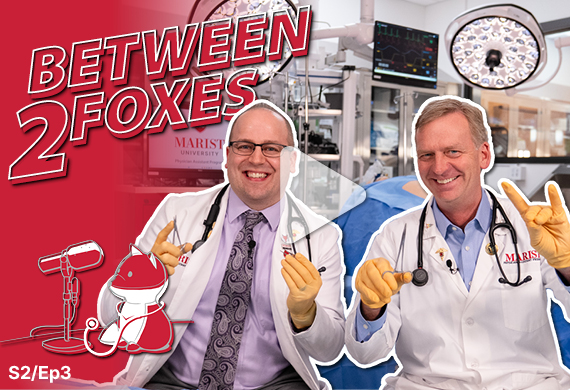Conducting Research, Building Resumes

(l-r) Rebecca Lopez ’21, Amy Pitts ’20, Tadd Bindas ’19, and Christopher Schlappich ’19
January 8, 2019—Marist students are increasingly conducting high-level research during their undergraduate careers, and this past summer, four mathematics majors completed summer Research Experiences for Undergraduates (REU) programs, sponsored by the National Science Foundation (NSF). These programs are highly competitive, with students from all over the United States applying and only the very best invited to participate. Even more impressive, two of the Marist students selected were in their freshman and sophomore years; REU participation is typically limited to students who have completed their junior year of college.
At an REU, students attend lectures, study mathematics usually not found in a traditional undergraduate curriculum, and work collaboratively in groups – typically, about two to four students – on open research topics. The work done on these projects often results in fresh insights that have meaningful real-world applications.
As Roger Norton, Dean of the School of Computer Science and Mathematics noted, “REUs are one of the most prestigious undergraduate research opportunities offered by the NSF and are very impressive to receive. An undergraduate institution like Marist having two or three rising seniors receiving REUs would be significant, but having four students, including both a freshman and sophomore, is remarkable. The mathematics faculty do a wonderful job both promoting the REU program and working with students who apply.”

Each of the summer 2018 REUs was a unique project that gave participating students the chance to work in teams on challenging research projects, enhancing both their skills and their resumes:

Rebecca Lopez '21
Rebecca Lopez ’21 of San Diego, California participated in the Emerging Scholars REU at St. Mary’s College of Maryland. This REU is design for talented mathematics students who are early in their college career. Lopez’s group worked on modeling permafrost melt by analyzing measures of active layer thickness near subarctic Canada. Lopez majors in applied mathematics with minors in economics and data science and analytics. An in-depth profile of her can be read here.
Amy Pitts ’20 of New Haven, Vermont attended the REU at Lafayette College in Pennsylvania. Pitts’ group refined a Bayesian Monte Carlo Markov Chain technique to detect the location of changes and/or breakpoints in time series data. She and her teammates were selected to present their research results at the Joint Mathematics Meetings – the largest mathematics conference in the world – this month in Baltimore. Pitts is a double major in applied mathematics and data science and analytics with a minor in computer science.

Tadd Bindas '19
Tadd Bindas ’19 of Ringoes, New Jersey participated in the REU at Oregon State University, where he and his teammates studied cross-sectional area and roughness as predictors for solute transport behavior at the reach scale. After spending eight weeks in Oregon building a dataset of tracer tests in the H.J. Andrews Experimental Forest, Bindas worked at Oregon State University studying underlying trends in his data using supervised machine learning algorithms in R. Bindas is a double major in mathematics and computer science, and he minors in information systems.
Finally, Christopher Schlappich ’19 of Newburgh, New York attended the Maritime Security Center’s Summer Research Institute, hosted by Stevens Institute of Technology in New Jersey. Schlappich’s multi-disciplinary team worked on optimizing the forward velocity of a wave glider, an unpiloted ocean-surface vehicle. They developed a model of the glider's hydrofoil system, working collaboratively with researchers both from other universities and from industry. Schlappich majors in applied mathematics at Marist.
Congratulations to all four of these Marist students for this national recognition of their academic talents!



